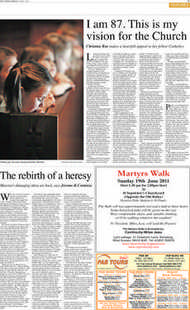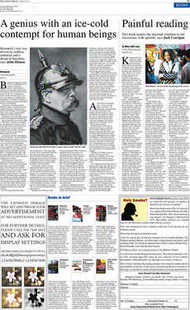Page 17, 3rd June 2011
Page 17

Report an error
Noticed an error on this page?If you've noticed an error in this article please click here to report it.
Tags
Share
Related articles
Oratory Marks Feast Of Founder
Archbishop Spends Oyful Evening With Oratory Fathers
Has The Spirit Of Philip Neri Left London's Oratory?
Archbishops Compare Notes On St Philip Neri
London Oratory Honours St. Philip Neri
PASTOR IUVENTUS
There was nothing narrow about Philip
Iwas fortunate enough to celebrate the Feast of St Philip Neri last week with the Fathers of the London Oratory. There was a prayerful Solemn Mass, a good sermon and music subtly chosen and beautifully performed. “Music truly becomes prayer, abandonment of the heart to God with a deep sense of peace,” reflects Pope Benedict, and this was my experience in that resonant, beautiful building. Mass was followed by a rather jolly dinner in St Wilfred’s Hall afterwards. In both the Fathers were being true to their founder’s inspiration.
I love St Philip because even among the glorious company of the saints he is so richly blessed and gifted. He’s the saint of “both-and” rather than “either-or”. So he combines the life of a hermit and mystic with tending the sick. For 10 years he exercises a lay apostolate of prayer, practical charity and evangelisation, but is open to the promptings of the Spirit when called to priesthood and then founds, without really intending to, a congregation of priests whose life is ordered to the sanctification of the laity. He operates in the post-Tridentine world of order and method, of rubric and visitation, but is all the while evolving an entirely original approach to the need for renewal in the Church and a new model of priesthood lived in community. He mingles with popes and cardinals, but in turn introduces them into his circle of artisans and clerks, to their mutual edification. He combines great miracles and supernatural graces with a love of friendship and conviviality.
Like the Curé of Ars centuries later, this man of burning pastoral charity found the need for beauty and sublimity in the celebration of the sacraments. Philip celebrated Mass in the manner commended by Mother Teresa, as though each Mass were his first, his last, his only Mass. Frequently just the thought of celebrating had him so wrapt that he had to be brought back down to earth by the servers telling him jokes in the sacristy beforehand. He was frequently seen to levitate during Mass. At the consecration he could go into an ecstasy and the server had to pull his chasuble to recall him to the external gestures of the Mass. He was frequently moved to tears by the words he was praying. Towards the end of his life he was given permission to celebrate Mass privately so as to avoid the embarrassment all this afforded him.
It is hardly accidental that this man who had such a feel for liturgy was also profoundly able to attract disciples. St Philip could have been the cheeriest, most “pastoral” of priests in the reductionist sense that word is used today, but he awoke in the young people who sought him out a hunger for the divine, for something more than the sociological aspect of belonging; he gave them a longing for holiness and for the presence of God in Word and Sacrament.
In some ways little has changed. Among the young people I know there is deep dismay at the folksy, banal, “zero-metaphsyics” approach to the liturgy that they encounter so widely and the preaching which often presupposes that they cannot be challenged to radical commitment or holiness. They are not weighed down by the baggage of yesteryear about liturgical language or music or rite. It is just that they are seeking a genuine experience of the divine, the numinous and often are failing to find it.
Some seek to drive a wedge between the exercise of pastoral charity and authenticity of life and the worthy and careful exercise of the hierarchical function of the priest. They imply that a younger generation of priests and seminarians, because they wish to dress as priests and like the Extraordinary Form of Mass, are likely to become crypto-clerical, Fascist perverts. To them it appears self-evident that if you are conscious of the dignity of your priesthood this is at the expense of your respect for the laity, that if you dress like a priest you are clearly covering something up, if you are concerned about how to celebrate Mass reverently you are unconcerned with real charity. Apparently this “clericalism” is what gave rise to the child abuse scandals as though to recognise a difference between priests and laity is automatically to realise that difference in terms of an imbalance of power.
What essentially differentiates the good priest from the clerical nightmare is the way in which he demonstrates his awareness of and reverence for the presence of God in all things. His awareness of this presence and docility to it will inform how he views the Church, her sacraments, her children, her teaching. Reverence for the liturgy is not some outmoded Tridentine formality or baroque ritualism. In fact, it is intimately connected to the mystery of what it means to approach the personhood of anyone else because in the liturgy we approach the Divine Lord. Liturgy makes my fundamental attitude of reverence for the Creator visible. The priest must literally embody it. To do this truly and really is at the same time to cultivate a symbiotic reverence for the presence of God in the other.
“To celebrate the liturgy in the awareness of the presence of God, with this dignity and beauty that allows one to see a bit of His splendour, is the task of every Christian formed in his faith,” said the Holy Father at the general audience of April 29 2009. There’s nothing narrowly clerical about it.
blog comments powered by Disqus





















